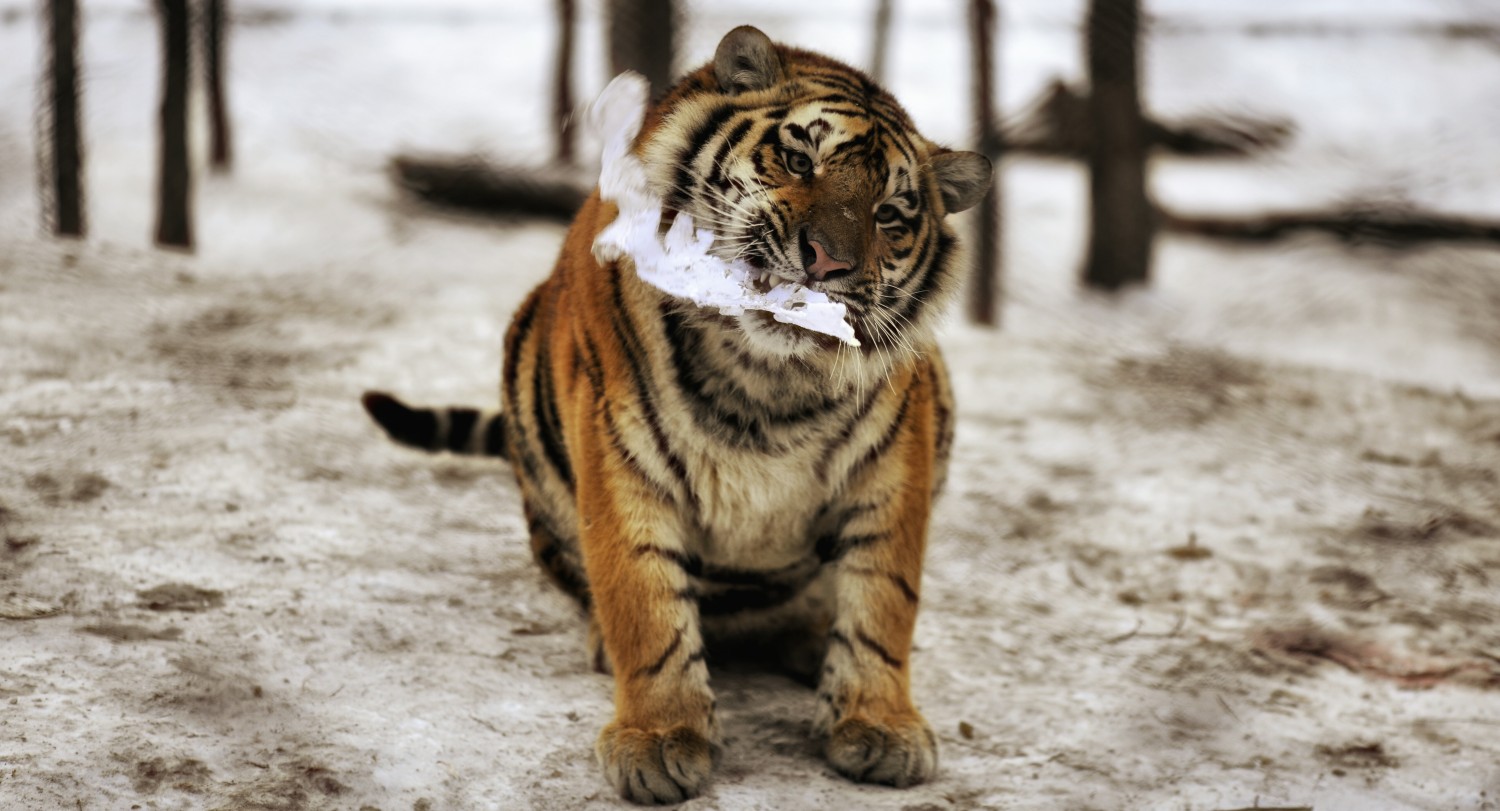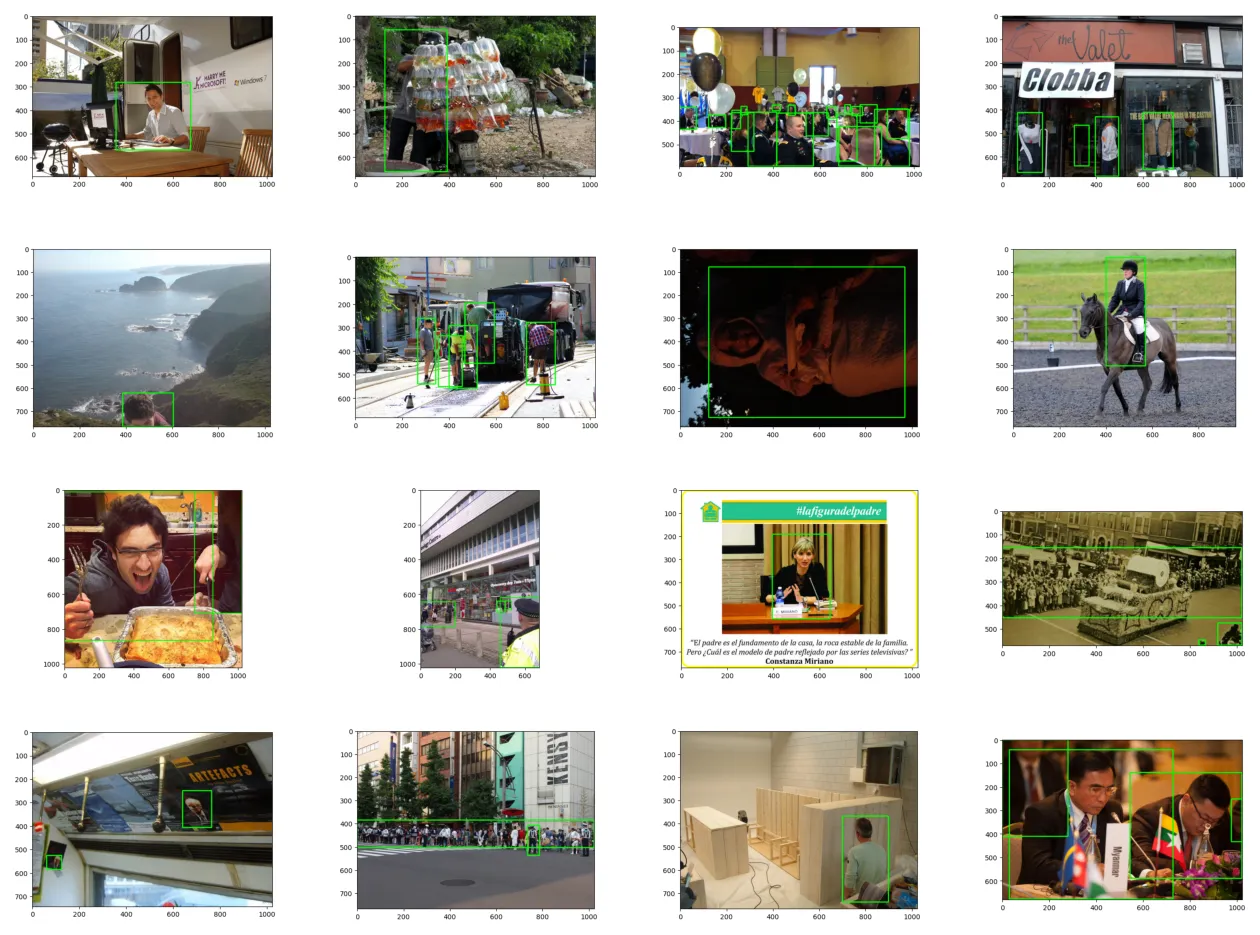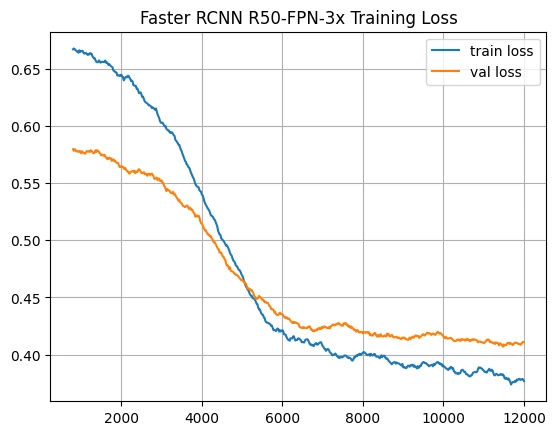
Related:
- Image Segmentation with PyTorch
- Semantic Segmentation Detectron2 Model Zoo
- Semantic Segmentation Detectron2 Model Zoo: Faster RCNN
- Semantic Segmentation Detectron2 Model Zoo: Mask RCNN
- Detectron Object Detection with OpenImages Dataset (WIP)
Detectron Object Detection with OpenImages Dataset (WIP)
Dataset
Download the annotations for the detection boxes from OpenImages:
!pip install opencv-python
!python -m pip install 'git+https://github.com/facebookresearch/detectron2.git'
import ast
import json
import cv2 as cv
import matplotlib.pyplot as plt
import numpy as np
import os
import random
import shutil
import torch
from detectron2 import model_zoo
from detectron2.config import get_cfg as _get_cfg
from detectron2.data import MetadataCatalog, DatasetCatalog, build_detection_train_loader
from detectron2.engine import DefaultTrainer, HookBase, DefaultPredictor
from detectron2.structures import BoxMode
import detectron2.utils.comm as comm
!wget https://storage.googleapis.com/openimages/v6/oidv6-train-annotations-bbox.csv -P '../datasets/OpenImages/annotations'
!wget https://storage.googleapis.com/openimages/v5/validation-annotations-bbox.csv -P '../datasets/OpenImages/annotations'
!wget https://storage.googleapis.com/openimages/v5/test-annotations-bbox.csv -P '../datasets/OpenImages/annotations'
!wget https://raw.githubusercontent.com/openimages/dataset/master/downloader.py -P './helper'
--2023-09-02 15:26:06-- https://storage.googleapis.com/openimages/v5/test-annotations-bbox.csv Loaded CA certificate '/etc/ssl/certs/ca-certificates.crt' Resolving storage.googleapis.com (storage.googleapis.com)... 142.251.214.144, 172.217.164.112, 142.250.72.208, ... Connecting to storage.googleapis.com (storage.googleapis.com)|142.251.214.144|:443... connected. HTTP request sent, awaiting response... 200 OK Length: 77484237 (74M) [text/csv] Saving to: ‘../datasets/OpenImages/annotations/test-annotations-bbox.csv’
test-annotations-bb 100%[===================>] 73.89M 8.05MB/s in 12s
2023-09-02 15:26:19 (6.31 MB/s) - ‘../datasets/OpenImages/annotations/test-annotations-bbox.csv’ saved [77484237/77484237]
Curate Dataset by Class
- Scripts by computervisioneng
- Get class IDs from here
# Create a text file containing all the image IDs that you're interested in downloading.
class_id = '/m/01g317' # 'Person'
# class_id = '/m/0k4j' # 'Car'
# class_id = '/m/0h2r6' # 'Van'
# class_id = '/m/01bjv' # 'Bus'
# class_id = '/m/07r04' # 'Truck'
# class_id = '/m/01jfm_' # 'Vehicle registration plate'
# class_id = '/m/01lrl' # 'Carnivore'
train_bboxes_filename = '../datasets/OpenImages/annotations/oidv6-train-annotations-bbox.csv'
validation_bboxes_filename = '../datasets/OpenImages/annotations/validation-annotations-bbox.csv'
test_bboxes_filename = '../datasets/OpenImages/annotations/test-annotations-bbox.csv'
image_list_file_path = '../datasets/OpenImages/image_class_person.txt'
# image_list_file_path = '../datasets/OpenImages/image_class_car.txt'
# image_list_file_path = '../datasets/OpenImages/image_class_van.txt'
# image_list_file_path = '../datasets/OpenImages/image_class_bus.txt'
# image_list_file_path = '../datasets/OpenImages/image_class_truck.txt'
# image_list_file_path = '../datasets/OpenImages/image_class_plates.txt'
# image_list_file_path = '../datasets/OpenImages/image_class_carnivore.txt'
image_list_file_list = []
for j, filename in enumerate([train_bboxes_filename, validation_bboxes_filename, test_bboxes_filename]):
print(filename)
with open(filename, 'r') as f:
line = f.readline()
while len(line) != 0:
id, _, class_name, _, x1, x2, y1, y2, _, _, _, _, _ = line.split(',')[:13]
if class_name in [class_id] and id not in image_list_file_list:
image_list_file_list.append(id)
with open(image_list_file_path, 'a') as fw:
fw.write('{}/{}\n'.format(['train', 'validation', 'test'][j], id))
line = f.readline()
f.close()
# the download returned 395931 images with class 'Person' -> I reduced them to 1% over all classes (3961) for this test run
# Run the following script to download all files, making sure you have the dependencies installed:
# !python helper/downloader.py --image_list='../datasets/OpenImages/image_class_person.txt' --download_folder='../datasets/OpenImages/complete' --num_processes=5
!python helper/downloader.py '../datasets/OpenImages/image_class_person_1%.txt' --download_folder='../datasets/OpenImages/complete' --num_processes=5
Downloading images: 100%|███████████████████| 3961/3961 [17:32, 3.76it/s]
# get ids for all files from list that were used
file_ids = []
text_file = '../datasets/OpenImages/image_class_person_1%.txt'
files_list = open(text_file, 'r')
lines = files_list.readlines()
for line in lines:
file_ids.append(line.strip()[-16:])
print(len(file_ids))
3961
for j, filename in enumerate([train_bboxes_filename, validation_bboxes_filename, test_bboxes_filename]):
print(j, filename)
0 ../datasets/OpenImages/annotations/oidv6-train-annotations-bbox.csv 1 ../datasets/OpenImages/annotations/validation-annotations-bbox.csv 2 ../datasets/OpenImages/annotations/test-annotations-bbox.csv
# Train/Test/Split + generate YOLO compatible annotations
DATA_ALL_DIR = '../datasets/OpenImages/complete'
DATA_OUT_DIR = '../datasets/OpenImages/split'
# create directories
for set_ in ['train', 'validation', 'test']:
for dir_ in [os.path.join(DATA_OUT_DIR, set_),
os.path.join(DATA_OUT_DIR, set_, 'imgs'),
os.path.join(DATA_OUT_DIR, set_, 'anns')]:
if os.path.exists(dir_):
shutil.rmtree(dir_)
os.mkdir(dir_)
# save images and annotations
for j, filename in enumerate([train_bboxes_filename, validation_bboxes_filename, test_bboxes_filename]):
set_ = ['train', 'validation', 'test'][j]
print(filename)
with open(filename, 'r') as f:
line = f.readline()
while len(line) != 0:
# get bbox
id, _, class_name, _, x1, x2, y1, y2, _, _, _, _, _ = line.split(',')[:13]
# take all bboxes with the correct class
if class_name in [class_id]:
# but remove all that are not used (the example only uses 1% of all available images)
if id in file_ids:
if not os.path.exists(os.path.join(DATA_OUT_DIR, set_, 'imgs', '{}.jpg'.format(id))):
shutil.copy(os.path.join(DATA_ALL_DIR, '{}.jpg'.format(id)),
os.path.join(DATA_OUT_DIR, set_, 'imgs', '{}.jpg'.format(id)))
# yolo conform annotations
with open(os.path.join(DATA_OUT_DIR, set_, 'anns', '{}.txt'.format(id)), 'a') as f_ann:
# class_id, xc, yx, w, h
x1, x2, y1, y2 = [float(j) for j in [x1, x2, y1, y2]]
xc = (x1 + x2) / 2
yc = (y1 + y2) / 2
w = x2 - x1
h = y2 - y1
f_ann.write('0 {} {} {} {}\n'.format(xc, yc, w, h))
f_ann.close()
line = f.readline()
../datasets/OpenImages/annotations/oidv6-train-annotations-bbox.csv ../datasets/OpenImages/annotations/validation-annotations-bbox.csv ../datasets/OpenImages/annotations/test-annotations-bbox.csv
IMGS_TRAIN_DIR = DATA_OUT_DIR + '/train/imgs'
ANNS_TRAIN_DIR = DATA_OUT_DIR + '/train/anns'
if __name__ == "__main__":
files = os.listdir(IMGS_TRAIN_DIR)
while True:
fig = plt.figure()
k = random.randint(0, len(files) - 1)
img = cv.imread(os.path.join(IMGS_TRAIN_DIR, files[k]))
ann_file = os.path.join(ANNS_TRAIN_DIR, files[k][:-4] + '.txt')
h_img, w_img, _ = img.shape
with open(ann_file, 'r') as f:
lines = [l[:-1] for l in f.readlines() if len(l) > 2]
for line in lines:
line = line.split(' ')
class_, x0, y0, w, h = line
x1 = int((float(x0) - (float(w) / 2)) * w_img)
y1 = int((float(y0) - (float(h) / 2)) * h_img)
x2 = x1 + int(float(w) * w_img)
y2 = y1 + int(float(h) * h_img)
img = cv.rectangle(img,
(x1, y1),
(x2, y2),
(0, 255, 0),
4)
mng = plt.get_current_fig_manager()
plt.imshow(cv.cvtColor(img, cv.COLOR_BGR2RGB))
plt.show()

Model Training
# create loss function https://github.com/computervisioneng/train-object-detector-detectron2
class ValidationLoss(HookBase):
"""
A hook that computes validation loss during training.
Attributes:
cfg (CfgNode): The detectron2 config node.
_loader (iterator): An iterator over the validation dataset.
"""
def __init__(self, cfg):
"""
Args:
cfg (CfgNode): The detectron2 config node.
"""
super().__init__()
self.cfg = cfg.clone()
# Switch to the validation dataset
self.cfg.DATASETS.TRAIN = cfg.DATASETS.VAL
# Build the validation data loader iterator
self._loader = iter(build_detection_train_loader(self.cfg))
def after_step(self):
"""
Computes the validation loss after each training step.
"""
# Get the next batch of data from the validation data loader
data = next(self._loader)
with torch.no_grad():
# Compute the validation loss on the current batch of data
loss_dict = self.trainer.model(data)
# Check for invalid losses
losses = sum(loss_dict.values())
assert torch.isfinite(losses).all(), loss_dict
# Reduce the loss across all workers
loss_dict_reduced = {"val_" + k: v.item() for k, v in
comm.reduce_dict(loss_dict).items()}
losses_reduced = sum(loss for loss in loss_dict_reduced.values())
# Save the validation loss in the trainer storage
if comm.is_main_process():
self.trainer.storage.put_scalars(total_val_loss=losses_reduced,
**loss_dict_reduced)
# create detectron2 configuration https://github.com/computervisioneng/train-object-detector-detectron2
def get_cfg(output_dir, learning_rate, batch_size, iterations, checkpoint_period, model, device, nmr_classes):
"""
Create a Detectron2 configuration object and set its attributes.
Args:
output_dir (str): The path to the output directory where the trained model and logs will be saved.
learning_rate (float): The learning rate for the optimizer.
batch_size (int): The batch size used during training.
iterations (int): The maximum number of training iterations.
checkpoint_period (int): The number of iterations between consecutive checkpoints.
model (str): The name of the model to use, which should be one of the models available in Detectron2's model zoo.
device (str): The device to use for training, which should be 'cpu' or 'cuda'.
nmr_classes (int): The number of classes in the dataset.
Returns:
The Detectron2 configuration object.
"""
cfg = _get_cfg()
# Merge the model's default configuration file with the default Detectron2 configuration file.
cfg.merge_from_file(model_zoo.get_config_file(model))
# Set the training and validation datasets and exclude the test dataset.
cfg.DATASETS.TRAIN = ('train')
cfg.DATASETS.VAL = ('validation')
cfg.DATASETS.TEST = ()
# Set the device to use for training.
if device in ['cpu']:
cfg.MODEL.DEVICE = 'cpu'
# Set the number of data loader workers.
cfg.DATALOADER.NUM_WORKERS = 2
# Set the model weights to the ones pre-trained on the COCO dataset.
cfg.MODEL.WEIGHTS = model_zoo.get_checkpoint_url(model)
# Set the batch size used by the solver.
cfg.SOLVER.IMS_PER_BATCH = batch_size
# Set the checkpoint period.
cfg.SOLVER.CHECKPOINT_PERIOD = checkpoint_period
# Set the base learning rate.
cfg.SOLVER.BASE_LR = learning_rate
# Set the maximum number of training iterations.
cfg.SOLVER.MAX_ITER = iterations
# Set the learning rate scheduler steps to an empty list, which means the learning rate will not be decayed.
cfg.SOLVER.STEPS = []
# Set the batch size used by the ROI heads during training.
cfg.MODEL.ROI_HEADS.BATCH_SIZE_PER_IMAGE = 128
# Set the number of classes.
cfg.MODEL.ROI_HEADS.NUM_CLASSES = nmr_classes
# Set the output directory.
cfg.OUTPUT_DIR = output_dir
return cfg
# get dataset https://github.com/computervisioneng/train-object-detector-detectron2
def get_dicts(img_dir, ann_dir):
"""
Read the annotations for the dataset in YOLO format and create a list of dictionaries containing information for each
image.
Args:
img_dir (str): Directory containing the images.
ann_dir (str): Directory containing the annotations.
Returns:
list[dict]: A list of dictionaries containing information for each image. Each dictionary has the following keys:
- file_name: The path to the image file.
- image_id: The unique identifier for the image.
- height: The height of the image in pixels.
- width: The width of the image in pixels.
- annotations: A list of dictionaries, one for each object in the image, containing the following keys:
- bbox: A list of four integers [x0, y0, w, h] representing the bounding box of the object in the image,
where (x0, y0) is the top-left corner and (w, h) are the width and height of the bounding box,
respectively.
- bbox_mode: A constant from the `BoxMode` class indicating the format of the bounding box coordinates
(e.g., `BoxMode.XYWH_ABS` for absolute coordinates in the format [x0, y0, w, h]).
- category_id: The integer ID of the object's class.
"""
dataset_dicts = []
for idx, file in enumerate(os.listdir(ann_dir)):
# annotations should be provided in yolo format
record = {}
filename = os.path.join(img_dir, file[:-4] + '.jpg')
height, width = cv.imread(filename).shape[:2]
record["file_name"] = filename
record["image_id"] = idx
record["height"] = height
record["width"] = width
objs = []
with open(os.path.join(ann_dir, file)) as r:
lines = [l[:-1] for l in r.readlines()]
for _, line in enumerate(lines):
if len(line) > 2:
label, cx, cy, w_, h_ = line.split(' ')
obj = {
"bbox": [int((float(cx) - (float(w_) / 2)) * width),
int((float(cy) - (float(h_) / 2)) * height),
int(float(w_) * width),
int(float(h_) * height)],
"bbox_mode": BoxMode.XYWH_ABS,
"category_id": int(label),
}
objs.append(obj)
record["annotations"] = objs
dataset_dicts.append(record)
return dataset_dicts
# register dataset https://github.com/computervisioneng/train-object-detector-detectron2
def register_datasets(root_dir, class_list_file):
"""
Registers the train and validation datasets and returns the number of classes.
Args:
root_dir (str): Path to the root directory of the dataset.
class_list_file (str): Path to the file containing the list of class names.
Returns:
int: The number of classes in the dataset.
"""
# Read the list of class names from the class list file.
with open(class_list_file, 'r') as reader:
classes_ = [l[:-1] for l in reader.readlines()]
# Register the train and validation datasets.
for d in ['train', 'validation']:
DatasetCatalog.register(d, lambda d=d: get_dicts(os.path.join(root_dir, d, 'imgs'),
os.path.join(root_dir, d, 'anns')))
# Set the metadata for the dataset.
MetadataCatalog.get(d).set(thing_classes=classes_)
return len(classes_)
# train the dataset
def train(output_dir, data_dir, class_list_file, learning_rate, batch_size, iterations, checkpoint_period, device,
model):
"""
Train a Detectron2 model on a custom dataset.
Args:
output_dir (str): Path to the directory to save the trained model and output files.
data_dir (str): Path to the directory containing the dataset.
class_list_file (str): Path to the file containing the list of class names in the dataset.
learning_rate (float): Learning rate for the optimizer.
batch_size (int): Batch size for training.
iterations (int): Maximum number of training iterations.
checkpoint_period (int): Number of iterations after which to save a checkpoint of the model.
device (str): Device to use for training (e.g., 'cpu' or 'cuda').
model (str): Name of the model configuration to use. Must be a key in the Detectron2 model zoo.
Returns:
None
"""
# Register the dataset and get the number of classes
nmr_classes = register_datasets(data_dir, class_list_file)
# Get the configuration for the model
cfg = get_cfg(output_dir, learning_rate, batch_size, iterations, checkpoint_period, model, device, nmr_classes)
# Create the output directory
os.makedirs(cfg.OUTPUT_DIR, exist_ok=True)
# Create the trainer object
trainer = DefaultTrainer(cfg)
# Create a custom validation loss object
val_loss = ValidationLoss(cfg)
# Register the custom validation loss object as a hook to the trainer
trainer.register_hooks([val_loss])
# Swap the positions of the evaluation and checkpointing hooks so that the validation loss is logged correctly
trainer._hooks = trainer._hooks[:-2] + trainer._hooks[-2:][::-1]
# Resume training from a checkpoint or load the initial model weights
trainer.resume_or_load(resume=False)
# Train the model
trainer.train()
CLASSES = '../datasets/OpenImages/class_names.txt' # add classes to this file - 1 per line
DATA_DIR = '../datasets/OpenImages/split' # point to dir that contains your train/validation/test folders
OUTPUT_DIR = '../saved_models/OpenImages_Model' # weight will be saved here at interval set below
DEVICE = 'gpu' # 'cpu'
LR = 0.00001
BATCH_SIZE = 4
ITERATIONS = 12000 # how many epochs do you want to train?
CHECKPOINT_PERIOD = 3000 # save weights at this epoch interval
# MODEL= 'COCO-Detection/fast_rcnn_R_50_FPN_1x.yaml' # 2.6 GB Train Mem
MODEL= 'COCO-Detection/faster_rcnn_R_50_FPN_3x.yaml' # 3.0 GB Train Mem
# MODEL= 'COCO-Detection/faster_rcnn_R_101_FPN_3x.yaml' # 4.1 GB Train Mem
# MODEL = 'COCO-Detection/retinanet_R_101_FPN_3x.yaml' # 5.2 GB Train Mem
train(
OUTPUT_DIR,
DATA_DIR,
CLASSES,
device=DEVICE,
learning_rate=float(LR),
batch_size=int(BATCH_SIZE),
iterations=int(ITERATIONS),
checkpoint_period=int(CHECKPOINT_PERIOD),
model=MODEL)
Problem:
Skip loading parameter 'roi_heads.box_predictor.cls_score.weight' to the model due to incompatible shapes: (81, 1024) in the checkpoint but (2, 1024) in the model! You might want to double check if this is expected.
WIP
[32m[09/03 16:20:53 d2.data.build]: [0mRemoved 0 images with no usable annotations. 3671 images left.
[32m[09/03 16:20:53 d2.data.build]: [0mDistribution of instances among all 1 categories:
[36m| category | #instances |
|:----------:|:-------------|
| Person | 15218 |
| | |[0m
[32m[09/03 16:20:53 d2.data.dataset_mapper]: [0m[DatasetMapper] Augmentations used in training: [ResizeShortestEdge(short_edge_length=(640, 672, 704, 736, 768, 800), max_size=1333, sample_style='choice'), RandomFlip()]
[32m[09/03 16:20:53 d2.data.build]: [0mUsing training sampler TrainingSampler
[32m[09/03 16:20:53 d2.data.common]: [0mSerializing the dataset using: <class 'detectron2.data.common._TorchSerializedList'>
[32m[09/03 16:20:53 d2.data.common]: [0mSerializing 3671 elements to byte tensors and concatenating them all ...
[32m[09/03 16:20:53 d2.data.common]: [0mSerialized dataset takes 1.17 MiB
[32m[09/03 16:20:54 d2.data.build]: [0mRemoved 0 images with no usable annotations. 72 images left.
[32m[09/03 16:20:54 d2.data.build]: [0mDistribution of instances among all 1 categories:
[36m| category | #instances |
|:----------:|:-------------|
| Person | 197 |
| | |[0m
[32m[09/03 16:20:54 d2.data.dataset_mapper]: [0m[DatasetMapper] Augmentations used in training: [ResizeShortestEdge(short_edge_length=(640, 672, 704, 736, 768, 800), max_size=1333, sample_style='choice'), RandomFlip()]
[32m[09/03 16:20:54 d2.data.build]: [0mUsing training sampler TrainingSampler
[32m[09/03 16:20:54 d2.data.common]: [0mSerializing the dataset using: <class 'detectron2.data.common._TorchSerializedList'>
[32m[09/03 16:20:54 d2.data.common]: [0mSerializing 72 elements to byte tensors and concatenating them all ...
[32m[09/03 16:20:54 d2.data.common]: [0mSerialized dataset takes 0.02 MiB
[32m[09/03 16:20:54 d2.checkpoint.detection_checkpoint]: [0m[DetectionCheckpointer] Loading from https://dl.fbaipublicfiles.com/detectron2/COCO-Detection/faster_rcnn_R_50_FPN_3x/137849458/model_final_280758.pkl ...
model_final_280758.pkl: 167MB [00:21, 7.86MB/s]
Skip loading parameter 'roi_heads.box_predictor.cls_score.weight' to the model due to incompatible shapes: (81, 1024) in the checkpoint but (2, 1024) in the model! You might want to double check if this is expected.
Skip loading parameter 'roi_heads.box_predictor.cls_score.bias' to the model due to incompatible shapes: (81,) in the checkpoint but (2,) in the model! You might want to double check if this is expected.
Skip loading parameter 'roi_heads.box_predictor.bbox_pred.weight' to the model due to incompatible shapes: (320, 1024) in the checkpoint but (4, 1024) in the model! You might want to double check if this is expected.
Skip loading parameter 'roi_heads.box_predictor.bbox_pred.bias' to the model due to incompatible shapes: (320,) in the checkpoint but (4,) in the model! You might want to double check if this is expected.
Some model parameters or buffers are not found in the checkpoint:
[34mroi_heads.box_predictor.bbox_pred.{bias, weight}[0m
[34mroi_heads.box_predictor.cls_score.{bias, weight}[0m
[32m[09/03 16:21:15 d2.engine.train_loop]: [0mStarting training from iteration 0
...
[32m[09/03 22:11:31 d2.utils.events]: [0m eta: 0:00:00 iter: 11999 total_loss: 0.6341 loss_cls: 0.1783 loss_box_reg: 0.3643 loss_rpn_cls: 0.01865 loss_rpn_loc: 0.02812 total_val_loss: 0.7417 val_loss_cls: 0.2803 val_loss_box_reg: 0.4251 val_loss_rpn_cls: 0.02334 val_loss_rpn_loc: 0.02181 time: 1.2499 last_time: 1.3406 data_time: 0.0571 last_data_time: 0.0050 lr: 1e-05 max_mem: 4713M
[32m[09/03 22:11:37 d2.engine.hooks]: [0mOverall training speed: 11998 iterations in 4:09:55 (1.2499 s / it)
[32m[09/03 22:11:37 d2.engine.hooks]: [0mTotal training time: 5:50:16 (1:40:20 on hooks)
Model Evaluation
Visualizing the metrics.json file generated in your above defined output dir:
def moving_average(a, n=3):
ret = np.cumsum(a, dtype=float)
ret[n:] = ret[n:] - ret[:-n]
return ret[n - 1:] / n
metrics_file = OUTPUT_DIR + '/metrics.json'
with open(metrics_file, 'r') as f:
metrics = [ast.literal_eval(l[:-1]) for l in f.readlines()]
f.close()
train_loss = [float(v['loss_box_reg']) for v in metrics if 'loss_box_reg' in v.keys()]
val_loss = [float(v['val_loss_box_reg']) for v in metrics if 'val_loss_box_reg' in v.keys()]
N = 40
train_loss_avg = moving_average(train_loss, n=N)
val_loss_avg = moving_average(val_loss, n=N)
plt.plot(range(20 * N - 1, 20 * len(train_loss), 20), train_loss_avg, label='train loss')
plt.plot(range(20 * N - 1, 20 * len(train_loss), 20), val_loss_avg, label='val loss')
plt.title('Faster RCNN R50-FPN-3x Training Loss')
plt.legend()
plt.grid()
plt.show()

Model Predictions
# Load config from a config file
cfg = _get_cfg()
cfg.merge_from_file(model_zoo.get_config_file(MODEL))
cfg.MODEL.WEIGHTS = OUTPUT_DIR + '/model_0011999.pth'
cfg.MODEL.DEVICE = 'cuda'
# Create predictor instance
predictor = DefaultPredictor(cfg)
# Load image
image = cv.imread(OUTPUT_DIR + "/sz.jpg")
# Perform prediction
outputs = predictor(image)
outputs
# Display predictions
threshold = 0.5
preds = outputs["instances"].pred_classes.tolist()
scores = outputs["instances"].scores.tolist()
bboxes = outputs["instances"].pred_boxes
for j, bbox in enumerate(bboxes):
bbox = bbox.tolist()
score = scores[j]
pred = preds[j]
if score > threshold:
x1, y1, x2, y2 = [int(i) for i in bbox]
cv.rectangle(image, (x1, y1), (x2, y2), (0, 0, 255), 5)
cv.imshow('image', image)
cv.waitKey(0)